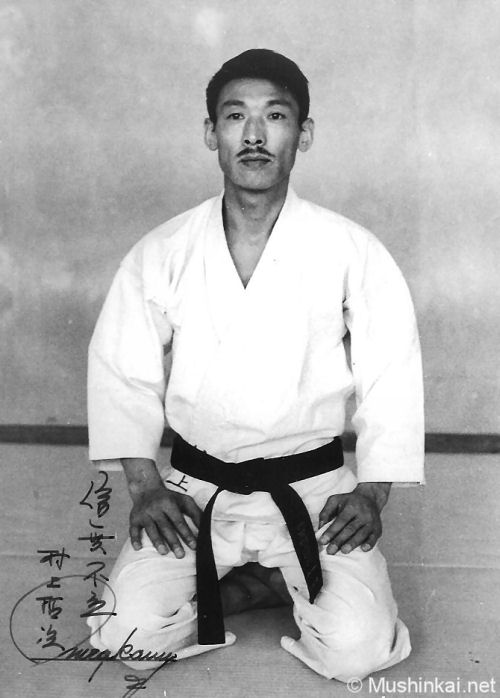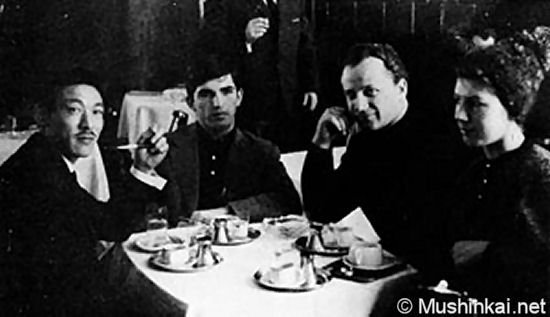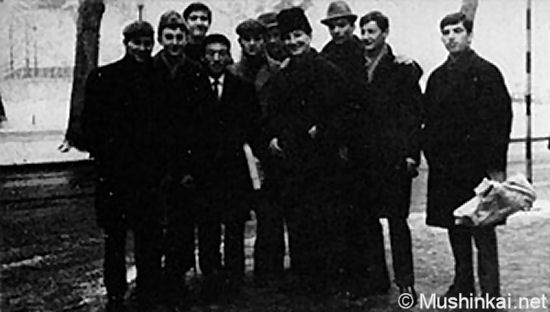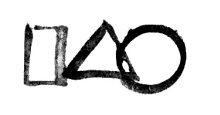Exclusive BLACK BELT Interview With
T. Murakami of Europe
BLACK BELT Editor Zarko Modric of Yugoslavia interviewed Mr. Tetsuji Murakami last winter:
Black Belt :
Why are you practicing karate ?
Murakami :
It is impossible for me to answer that question. It is like asking a smoker to explain to a nonsmoker why he is smoking. Everyone who is practicing karate will understand me, and others won't even if I try to explain.
Black Belt :
What made you start practicing karate ?
Murakami :
I wanted to see for myself what was so dangerous in karate. When I was a boy, everyone in Japan believed that karate was very dangerous, and that people that were practicing karate were dangerous too.

Black Belt :
What did you find out ?
Murakami :
That karate is not dangerous at all. Karate is like a knife. You give a knife to a normal man. He will put it in a pocket, and use it for cutting his steak. But give that same knife to a crazy man, and he will hurt somebody. In a crazy man's hands even a spoon is dangerous. Karate is not dangerous, there is no danger in karate. People are dangerous, or they are not, but it depends only on individuals. There is a risk if a crazy person learns karate, but the same person can buy a knife or a gun, can make a bomb or drive a car and the danger is much bigger.
Black Belt :
What is your aim in karate ?
Murakami :
My aim, and everybody's aim in karate, must be the same perfection. But it cannot be reached. I will be an old man, and I will still want to learn some more about karate. I will still want to make some movement better.
Karate never ends, if a man takes it seriously. Maybe I will become a great professor of karate, maybe not, but I will be satisfied. I gave my life to karate, and karate gave a way of life to me.

(*)
Black Belt :
What do you think about present day karate ?
Murakami :
Karate did not reach its top yet. If you take judo for example, you will see that judo reached its top as a sport and as a system. Karate must be perfected, systematized, organized. Yet, karate made an enormous progress.
Black Belt :
Do you think that present day karatemen are better than masters of the past ?
Murakami :
No. In the past karate masters did nothing but karate, and the results were that they were really outstanding. Now a man must work, earn money for his living, watch TV, have a family. Naturally, he cannot reach the same heights but while in the past there were only a few great masters, now the general level of karatemen is much higher, because many people are practicing karate, and many are very, very, good.
Black Belt :
Do you believe that ail karate schools will be organized together in a unique system?
Murakami :
This is a must. We must have one karate. Now in Japan four schools are dominant: Shotokan, Gojuryu, Chitoryu, and Wadoru. All of them have their advantages and shortcomings. Other schools and systems are much smaller in the number of participants and in importance. But unity is very important for a bigger growth of karate in the future.
Black Belt :
Do you believe that another Jigoro Kano can appear in karate and unite all the systems, like the real Kano did with ju-jitsu, forming judo ?
Murakami :
No. It is impossible for one man. Jigoro Kano had a good opportunity, because he lived at the end of the Samurai era, when many jujitsu teachers became jobless. And you must not forget that Mr. Kano was an exceptional man. Karate must be united by coordination of many people, and I do not believe that it will be done within the next 8 or 10 years.

Black Belt :
You mentioned judo. Can you compare these two martial arts and sports ?
Murakami :
These two great martial arts are not comparable. Judo is best for shorter or heavier men, and karate is best for higher and slimmer sportsmen. Naturally, there are many exceptions, but it can be applied as a general rule. One prefers judo, another prefers karate, and it is a question of taste.
Black Belt :
You are against the brick-breaking aspect of karate. Do you think it is not a part of karate ?
Murakami :
The karateman must harden his hands and legs, but not to break bricks. The hand must be hardened, or the karateman can hurt it when he hits somebody. If you are breaking a brick to see, for yourself, the degree of your skill and the durability of your hands, that is O.K. But many people are thinking that broken bricks make them karate experts. In Japan many people are cracking stones and bricks on the streets with their hands for money, but they do not even know karate. They are only toughening their hands to earn money by showing their strength on the street. Anybody can break a brick after a year of practice with a makiwara punching board. But karate is much more than brick breaking.
Black Belt :
Did you ever use karate in a street fight ?
Murakami :
No. I can easily step aside if anybody tries to hit me so I do not have to fight him. If it is needed I can block any punch, but I do not think it is fair to use my knowledge against someone who does not know karate.
Black Belt :
Tell us something about your plans for the future ?
Murakami :
I am planning to form a European Confederation of Karate. The Federation National Sportive Culturelle de Karate et Kendo France, the Italian Karate Federation and the federations of Germany, Switzerland, Yugoslavia and some other countries are interested in that project.
Black Belt :
What about your personal plans ?
Murakami :
Now I must decide where I will live, because my wife Yoshi, and my sons Yukitoshi, 14, and Mitoshi, 13, are coming to join me in Europe. I am not sure that I will stay in Paris, because I am invited to live in Italy. I am a karate missionary, and I must stay in Europe because my task is not fulfilled yet. When European karate is developed and strong enough, I will return to my homeland, Japan.
Zarko Modric.
(*) Murakami's pleasures are a pipe and coffee as black as his karate belt. "If a man takes it seriously," he told BLACK BELT editor Modric in an interview in a Zagreb cafe, "if a man takes it seriously, karate never ends. Whatever happens, I will be satisfied — I gave my life to karate and karate gave a way of life to me."
|



